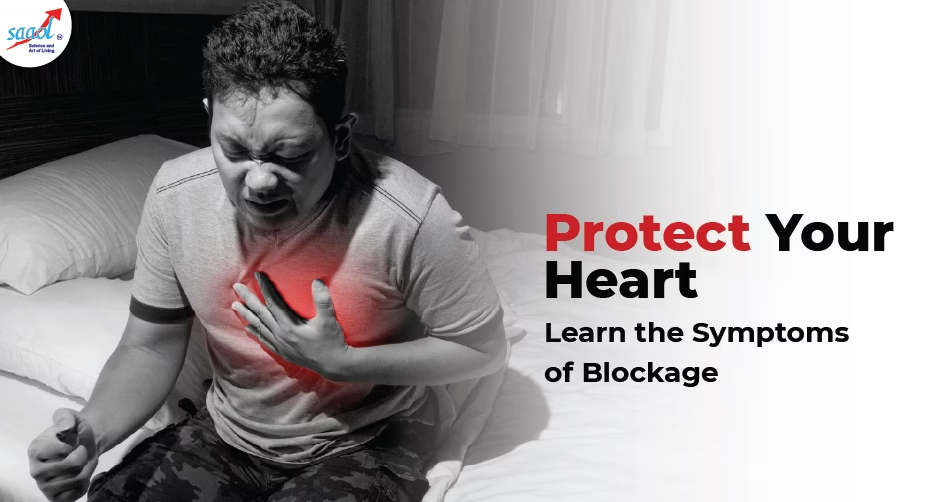If you’ve ever experienced chest pain, shortness of breath, or ongoing fatigue, you’ve probably asked yourself, Could this be a sign of a heart blockage?
You’re not alone. And this question thousands of people all across India ask every day. Fear of “heart blockages” frequently causes worry, sleepless nights, and endless thoughts about surgery or bypass.
But what you really need to know is that heart blockages can be treated and managed naturally with appropriate guidance, lifestyle, therapies including EECP, heart-healthy diet, and SAAOL Detox therapy.
This blog will bring awareness to heart blockage symptoms, causes, diagnosis, and treatments, explained in a way that anyone can understand.
Table of Contents
ToggleWhat Is a Heart Blockage?
Your heart is like a pump, and its arteries are like water pipes delivering blood full of oxygen and nutrients. Over time, these arteries can become narrow or blocked from a buildup of fatty substances known as plaque.
It is called coronary artery disease (CAD) or, in general, heart blockage.
The more the blockage grows, the less blood reaches your heart muscles, making you susceptible to chest pain, fatigue, and potentially even a heart attack if untreated.
Heart Blockage Symptoms
Recognizing the early heart blockage symptoms can help prevent major heart problems. But the signs can vary from person to person.
Common Symptoms of Heart Blockage
- Chest pain or pressure (angina): This may feel like a tight ache, pressure, fullness, or squeezing in the center of your chest that lasts more than a few minutes; it can also go away and come back.
- Shortness of breath: You might have difficulty breathing even when performing light activities.
- Fatigue: Unexplained fatigue or weakness beyond the everyday tiredness that does not improve with rest.
- Pain in the jaw, neck, arms, or back: The pain sometimes radiates beyond the chest.
- Palpitations or irregular heartbeat.
- Sweating and dizziness.
Symptoms of Heart Blockage in Males
Men typically have the classic symptoms of chest pain or pressure that’s worse with physical activity.
Symptoms of Heart Blockage in Females
Women may feel silent symptoms such as fatigue, nausea, back or jaw pain, and breathlessness rather than acute chest pain. It’s why women with heart disease too often are diagnosed late.
Recognizing these gender-specific symptoms is critical for catching the disease early and having better outcomes.
Reason for Heart Blockage
The most common reason for heart blockage is plaque accumulation in the coronary arteries, which is a combination of cholesterol, fat, calcium, and other substances.
Key Causes Include:
- High cholesterol levels.
- Uncontrolled high blood pressure.
- Smoking or tobacco use.
- Poor dietary habits, eating fried and processed food.
- Lack of exercise and obesity.
- Diabetes.
- Stress and inadequate sleep.
Over time, these factors damage the artery walls, causing plaque to deposit and restrict blood flow, leading to vein blockage in the heart.
Risk Factors for Heart Blockage
Some individuals are more likely to develop heart blockages than others.
Common Risk Factors Include:
- Age above 40
- Family history of heart disease
- High cholesterol or triglycerides
- Diabetes
- Hypertension
- Smoking
- Sedentary lifestyle
- Stressful work environment
If you identify with more than one of these risk factors, you should get yourself tested for heart blockage even if you feel fine.
Types of Heart Blockage
There are primarily two kinds of heart blockages you should be familiar with:
Electrical Heart Block
They occur when the electrical signals that control your heartbeat slow down or are blocked. It’s noted as heart block on ECG reports (first-degree, second-degree, or complete heart block).
Artery Blockage (Coronary Blockage)
This is when the arteries get physically blocked directly by plaque buildup, and oxygen supply to the heart decreases. That is what we call heart blockage.
How to Check Heart Blockage At Home

You can’t diagnose a blockage yourself, but you might be able to pick up on warning signals that suggest it could be time for a check-up:
- Chronic pain in the chest or pressure after walking up the stairs.
- You are fatigued easily after little effort.
- Shortness of breath without reason.
- Swelling in feet or ankles.
- Unexplained anxiety or sweating.
If you’re regularly seeing these, it’s time to go see a heart specialist.
Heart Blockage Test and Diagnosis
A diagnosis of heart blockage is usually confirmed and assessed by a cardiologist based on the results from multiple investigations, including:
- ECG (Electrocardiograph): Records abnormal heart rhythms or electrical blocks.
- Echocardiogram (Echo): Provides an image of the heart’s functioning and valve movement.
- TMT (Treadmill Test): Examines the working of your heart under stress.
- CT Coronary Angiography: It is a non-invasive test to determine the presence of any artery blockage.
- Traditional Angiography: An Invasive test in which a dye is injected to monitor clogged blood vessels.
These diagnostic methods of heart blockage assist doctors in developing a personalized treatment approach.
Complications of Heart Block
Ignoring symptoms can lead to serious complications of heart block:
- Heart attack (Myocardial Infarction)
- Heart failure
- Irregular heartbeat (Arrhythmia)
- Sudden cardiac arrest
That’s why early detection and a possible lifestyle modification are essential to eliminate these risks.
Treatment of Heart Blockage
Traditionally, heart blockages were treated with bypass surgery or angioplasty. But today, modern and non-invasive options are available.
At SAAOL Heartcare Delhi, we believe in treating heart blockages without surgery using safe, effective, and science-backed methods.
EECP Treatment (Enhanced External Counterpulsation)
EECP is a non-invasive treatment which can help generate new pathways around the arteries (collaterals) to supply oxygen-rich blood to the heart, so long-term improvement in symptoms and exercise tolerance, as well as a possible reduction in angina, chest pain.
It involves air pressure cuffs on your legs that fill with air and deflate in rhythm to your heartbeat, boosting the flow of oxygen-rich blood to the heart.
This is for bypassing heart blockages naturally, improving energy, reducing chest pain, and preventing future heart attacks.
Dr Bimal Chhajer: “EECP is a reasonable, safe option for those who are not candidates for bypass or angioplasty.”
Diet Consultation
Garima Arora, Head-nutrition at SAAOL Heartcare, says that “Your diet can either clog or clean your arteries.”
SAAOL’s heart-healthy diet consultations focus on:
- Reducing oil and fat intake.
- Including whole grains, fruits, and vegetables.
- Managing diabetes and cholesterol naturally.
This helps remove heart blockages naturally and improves your overall heart function.
SAAOL Detox Therapy
SAAOL Detox therapy cleans toxins and improves the circulation of blood. It beneficially affects the liver and lowers inflammation, two important factors for controlling heart disease.
Discover: SAAOL Detox Therapy Delhi
Lifestyle Management and Stress Control
We focus on total lifestyle management at SAAOL with yoga, meditation, and stress management because stress is a silent reason for heart blockage.
Find out: Lifestyle Modifications at SAAOL Heartcare
How to Manage Heart Blockage Naturally
If you want to manage heart blockage without surgery, follow these steps:
- Maintain a healthy, oil-free diet.
- Exercise regularly under medical supervision.
- Do yoga and meditation to decrease stress and tension.
- Quit smoking and alcohol.
- Take regular EECP therapy sessions.
- Continue to follow up with your heart doctor.
Even such small changes can make for a big improvement in your heart health.
Can Heart Blockages Be Prevented?
Yes. Prevention begins with awareness and discipline. If you manage your risk factors early, you can stop most heart blockages from getting worse. Begin with a basic heart checkup, adopt a heart-friendly diet, and concentrate on mental peace and lifestyle balance.
At SAAOL Heartcare Delhi, we reverse heart disease through non-invasive treatment, nutrition, and preventive education.
Conclusion
Heart blockages don’t develop overnight; they develop silently and over many years. But with early identification, lifestyle modification, and the right guidance, you can live a long, healthy life without surgery.
At SAAOL Heartcare Delhi, our mission is to save hearts without cutting through EECP therapy, zero-oil cooking, detox, and holistic heart care.
If you or your loved one is struggling with heart blockage, don’t wait for symptoms to worsen.
Book your consultation today and discover how your heart can heal naturally.
Book Appointment Call NowFAQs
- What are the symptoms of heart blockage?
The main heart blockage symptoms include chest pain, fatigue, breathlessness, and pain radiating to the jaw or arms.
- How to check heart blockage at home?
While you can’t diagnose at home, noticing consistent chest pressure or breathlessness should prompt a medical check-up.
- What are the risk factors for heart blockage?
High cholesterol, diabetes, smoking, obesity, and stress are major risk factors for heart blockage.
- What test confirms heart blockage?
A CT angiography or conventional angiography is the most accurate test for heart blockages.
- What is the treatment of heart blockage?
Treatment may include EECP therapy, lifestyle changes, diet modification, or surgery in advanced cases.


